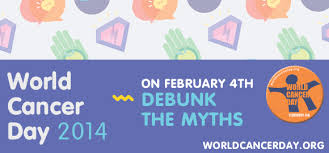
Photo Credit: www.worldcancerday.org
February 4 marks World Cancer Day, a time when the entire global community — regardless of nationality, profession, ethnicity, or any other form of identity — collectively remembers those whom cancer has impacted or claimed. Yet it is also a day when we’ll celebrate the miraculous accomplishments in cancer research and care and renew our vows to reduce — if not eradicate — premature cancer mortality. World Cancer Day is the opportunity for the cancer activists, advocates, patients and family members, and policy makers to coalesce around a unified decision to make cancer a global agenda item of paramount significance and set the tone for 2014 in how we conquer cancer.
There are hundreds of events taking place worldwide, from advocacy missions to volunteering with cancer patients, and signing the World Cancer Declaration. However, before you do, you’ll want some of the important facts and to understand where the myths lie!
Cancer Myths Debunked! Your Toolkit to Cancer Advocacy
The Union for International Cancer Control (UICC), a membership-based NGO in Geneva, is built on a foundation of over 800 cancer organizations working worldwide with the common mission to “unite the cancer community to reduce the global cancer burden.” However, on February 4, World Cancer Day, these organizations work especially hard to challenge our assumptions on cancer.
According to the World Cancer Day Advisory Group and UICC, here are the most common myths of cancer and the advocacy messages you’ll need to dispel those myths.
Debunk the cancer myths! (Click each myth to read more and get your global advocacy message point)
Myth #1: We don’t need to talk about cancer
The Truth? While cancer can be a difficult topic to address, particularly in some cultures and settings, dealing with the disease openly can improve outcomes at an individual, community, and policy level
Myth #2: There are no signs or symptoms of cancer.
The Truth? Recognize Signs and Symptoms! It is important for individuals, communities, health professionals, and policy makers to be aware of, and educated in recognizing the signs and symptoms for cancer (where possible).
Myth #3: There is Nothing I Can Do About Cancer
The Truth? There is a lot that can be done at an individual, community and policy level, and with the right strategies, a third of the most common cancers can be prevented.
Myth #4: I Don’t Have the Right to Cancer Care
The Truth? All people have the right to access proven and effective cancer treatment and services on equal terms, and without suffering hardship as a consequence.
A Global Message
Contrary to popular perception, cancer is not exclusive to the developed world. As developing nations adopt Western lifestyles and environmental risk factors proliferate, the mutation of cancer has covered the map. For instance, “There were 14.1 million new cancer cases, 8.2 million cancer deaths and 32.6 million people living with cancer (within 5 years of diagnosis) in 2012 worldwide57% (8 million) of new cancer cases, 65% (5.3 million) of the cancer deaths and 48% (15.6 million) of the 5-year prevalent cancer cases occurred in the less developed regions.”
There are few causes out there more serious than cancer. Most of you reading this probably know someone directly who has been touched by cancer. Therefore, take a moment on World Cancer Day to understand the truths of cancer, dispel the myths, look up ways to get involved locally, sign the World Cancer Declaration, and be humbled to be part of one of the largest international forces to combat a common disease.